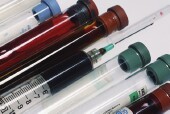Zinc deficiency frequently misdiagnosed; awareness of copper deficiency lacking
FRIDAY, June 19, 2015 (HealthDay News) — Zinc deficiency is often misdiagnosed based on low plasma zinc concentrations, and those prescribed high doses of zinc are at risk for copper deficiency, according to a study published online June 17 in the Journal of Clinical Pathology.
Andrew Duncan, Ph.D., from the Glasgow Royal Infirmary in the United Kingdom, and colleagues scrutinized case notes from 70 patients prescribed zinc. They reviewed the plasma concentrations of zinc, copper, C-reactive protein, and albumin from the laboratory database.
The researchers found that 62 percent of patients were prescribed zinc at doses that could cause copper deficiency. Plasma zinc concentrations were low in 48 percent of the patients, which may have been a result of hypoalbuminemia or the systemic inflammatory response rather than deficiency, according to the authors of the report. There was a lack of awareness of copper deficiency; it was documented as a possible side effect in only one patient, and only two patients prescribed zinc underwent plasma copper measurement. Unexplained anemia developed in 9 percent of patients, and 7 percent developed neurological symptoms indicative of copper deficiency.
“Zinc deficiency is frequently misdiagnosed on the basis of low plasma zinc concentrations,” the authors write. “The potential risk of copper deficiency developing in patients prescribed high doses of zinc is apparently infrequently considered.”
Copyright © 2015 HealthDay. All rights reserved.








